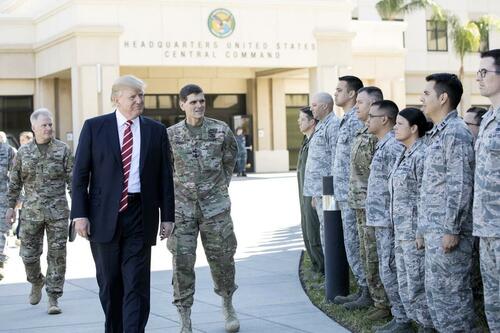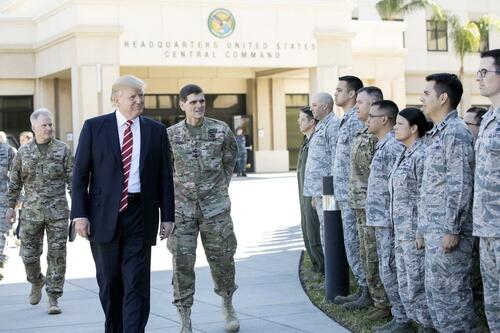National Security In A Second Trump Administration
Authored by Dan Greenwood via RealClearPolitics,
After a tumultuous and nearly life-ending July, Donald Trump narrowly retains his lead in the polls. Business leaders would be wise to prepare for a second Trump administration.

As someone detailed to serve in the White House during my time in the Marine Corps, I know firsthand what national security policy means to President Trump. The 2017 National Security Strategy, Trump’s first-term policies, and his words in and out of office are the best indicators of what a second Trump administration agenda would entail. This amounts to a more expansive view of national security, one that stresses U.S. economic and technological primacy. Great power competition with China would dominate.
A Trump administration would no longer permit China to steal U.S. intellectual property or undercut our industries. Rather, the U.S. would aim to blunt Chinese control of critical minerals and commodities, and end exports here at fire sale prices. Pervasive Chinese misconduct would be met with a vigilant response. Protecting our technological advantages and economic interests would become paramount.
The threat posed by China is already a bipartisan concern. This is one area where Republicans and Democrats have previously cooperated across the aisle.
Trump will prioritize sustaining and growing America’s technological and innovative edge. Expect him to leverage the power of government to the advantage of U.S. workers and industry, especially in manufacturing. Here, a second Trump term will likely build upon first-term tariffs and export controls.
The past stands as a prelude. In March 2018, President Trump exercised his authority under Section 232 of the Trade Expansion Act. He set a 25% tariff on steel imports and a 10% tariff on imported aluminum. His administration also imposed Section 301 tariffs on more than $300 billion worth of goods from China.
A Trump second term would likely double down on these actions. Many observers project increased tariffs on Chinese goods. A second Trump administration would also likely pressure our European and Indo-Pacific allies to mirror our export control and sanctions regimes vis-à-vis China. President Trump understands that technological supremacy is key to national security.
During his first term, he made a review by the Committee on Foreign Investment in the United States (CFIUS) a strategic imperative. In 2018, he signed into law the expansive Foreign Investment Risk Review Modernization Act (FIRRMA), the most comprehensive CFIUS reform since 2007. Among many CFIUS actions, in early March 2020, he directed a Beijing company and its Hong Kong-based subsidiary to divest their interests in StayNTouch, Inc., a U.S. mobile technology and property-management systems company.
Looking forward, a second Trump Administration would increase CFIUS investigations and declarations while expanding CFIUS oversight to include real estate near military bases and installations. As Trump sees things, China cannot be permitted to endanger national security through seemingly innocuous transactions.
Beyond that, Trump 2.0 will likely focus on Chinese efforts at intellectual espionage and influence at American universities. In 2020, Trump issued his Proclamation on the Suspension of Entry as Nonimmigrants of Certain Students and Researchers from the People’s Republic of China, aiming to prevent U.S. campuses from becoming incubators for the next generation of our adversaries. Future actions will seek to secure our national laboratories and national security-related research programs.
Trump’s America First vision isn’t isolationism. Rather, it is a rational course of action for advancing U.S. interests while securing the country’s economic and national security priorities, and those of our allies.
If reelected, Trump will likely demand that NATO’s members increase their defense spending. But directing Europeans to take a greater role in defending themselves is different than abandoning a historic alliance, something Trump won’t do.
A Trump administration would look to build on the 2021 Trilateral agreement between Australia, the U.K., and the U.S. (AUKUS). This would bolster U.S. interests in the Pacific as we seek to stand toe-to-toe with China across a broad range of issues. The Pacific is not a Chinese lake. Expanding AUKUS to include Japan and South Korea, even if through bilateral agreements, would be likely.
AUKUS illustrates Trump’s focus on foreign military sales (FMS) and their positive impact on the economy, the defense industrial base, and allied interoperability.
President Trump will likely demand record defense spending. Restoring America’s strength comes first; deficit hawks must take a backseat.
During his first term, President Trump stabilized and added predictability to defense spending with the 2018 Bipartisan Budget Act. Subsequent years saw ever-increasing defense funding, and this would continue in a second Trump term with particular emphasis on shipbuilding, aircraft, autonomous systems, and long-range weapons.
During his final year in office, Trump sought $34.7 billion to grow and modernize the Navy’s fleet, the largest request of its kind in more than 20 years. Trump’s America First philosophy will both continue to expand our naval capacity and reinvigorate our shipyards for defense and commercial purposes.
Trump’s defense budgets will also include robust investments in artificial intelligence and quantum sciences, areas vital for both U.S. economic and national security. A new Trump administration will invest heavily in funding critical technology research and development at the Pentagon, national laboratories, and private industry. Losing the AI and quantum races to China carries grave national security implications.
Hyperbole and rhetoric will dominate the airwaves for the final three months of the presidential campaign. But business leaders who anticipate the policy-rich national security landscape a second Trump administration promises will be well-positioned to reap the benefits.
Dan Greenwood served as deputy assistant to President Trump and deputy director of the White House Office of Legislative Affairs from 2017-2019. He previously served as the senior director for Legislative Affairs at the National Security Council. He is a principal at the BGR Group, a Washington, D.C.–based lobbying and communications firm where he leads the Defense and Critical Technologies practice.
Tyler Durden
Wed, 08/07/2024 – 20:05


